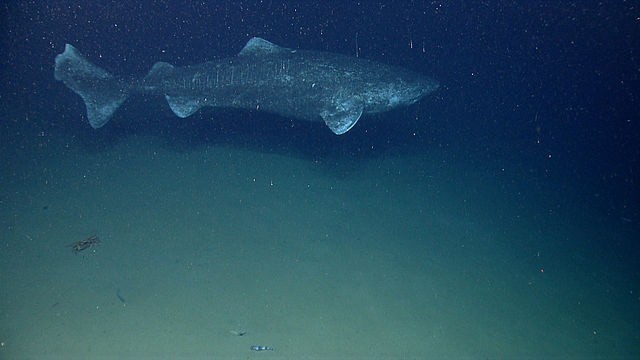Arctic shark from the deep oceans has been discovered in the Caribbean.
A Greenland shark was sighted off the coast of Belize, suggesting that the species may be more common than previously believed.

The Greenland shark is no exception to the rule that most sharks' lives are still mostly unknown, according to Britannica, but what experts have just learned is astounding.
Studying the Elusive Greenland Shark
Since a parasite started attaching to their corneas a few decades ago, scientists have learned that these ancient Arctic mammals may live up to 400 years and are frequently blind.
Although their primary diet consists of fish and squid, they have also been observed scavenging animal corpses, including those of horses, reindeer, and even polar bears.
The most recent surprise occurred in spring 2022 when researchers discovered a Greenland shark thousands of miles outside its recognized habitat in the western Caribbean, according to an article by the National Geographic.
Even though researchers have come to anticipate the unusual with these sharks, the sighting caught them off guard.
Shark DNA
Devanshi Kasana, a doctorate candidate at Florida International University, and a group of Belizean fishermen accidentally caught the shark while on a tiger-shark tagging excursion.
"It was both shocking and exhilarating," Kasana said via the United Press International or UPI.
Their discovery was published in the journal Marine Biology in July.
Shark specialists have concluded that the animal was probably a Greenland shark based on images of it, despite Kasana's inability to obtain a DNA sample to confirm the shark's identification.
This unusual encounter casted doubt on the Greenland shark's real range, which was previously thought to be limited to the frigid seas of the North Atlantic Ocean.
The sighting took place close to the second-longest barrier reef in the world, off the southern coast of Belize, in the deep seas off Glover's Reef, an atoll that is half underwater, Kasana had cast a longline.
Kasana's objective was to capture and tag tiger sharks so she could observe their ecology and activity.
However, the team had been considering quitting because of the challenging conditions on the day of the encounter. They then proceeded to get their reel, though.
An Incredibly Rare Sighting
Hector Martinez, a fisherman who assists Kasana in her study, added, "We instantly sensed there was something heavy on the rope."
The line's hydraulic reel worked hard to bring its catch to the surface. After two hours of combat, the shark was finally seen.
Kasana and the team weren't first sure what they were seeing. Even with their combined years of fishing knowledge, she claimed, "we didn't recognize what species it was until that individual rose to the top."
She speculated that it might be a six-gill shark, which can be found worldwide in deep ocean conditions.
She submitted a photo of the shark to Demian Chapman, her Ph.D. adviser and the director of Florida's Mote Marine Laboratory & Aquarium, who responded that it wasn't a six-gill.
He then said it was probably a Greenland shark.
These large-bodied sharks may grow to 23 feet and weigh 1.5 tons. Greenland sharks are primarily scavengers and will eat the carcasses of large mammals that find their way to the bottom, although they have been found to hunt seals, fish, and squid.
Really Old Sharks
Greenland sharks have lately been designated the world's longest-living animal by scientists.
They may live up to 400 years, according to scientists, and in 2016 a 272-year-old specimen was discovered off the coast of Greenland.
Scientists can ascertain its age by radiocarbon dating the tissue at the center of their eyes, made up of proteins created when the shark was first born.
Glover's Reef and the surrounding deep seas are among the three atolls that the Belizean government recently designated areas for protecting sharks.
The discovery will "assist in preserving whatever undiscovered critters inhabit the waters of Glover's," Kasana added, and that she and her team are "thrilled" to have made it.
For more animal news, don't forget to follow Nature World News!
© 2026 NatureWorldNews.com All rights reserved. Do not reproduce without permission.





